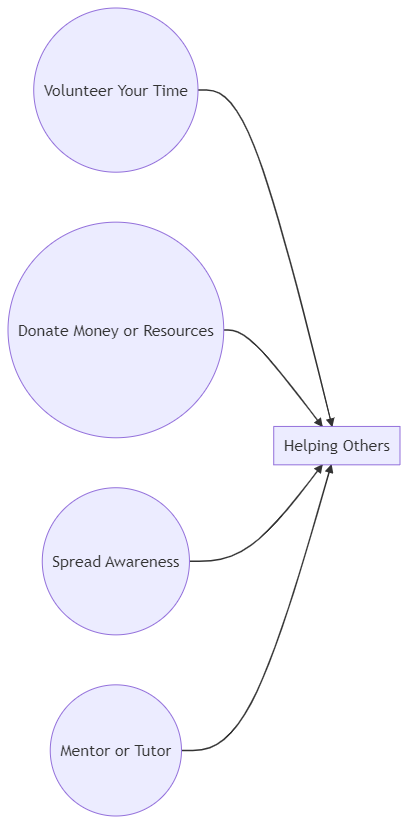
At our core, we all want to lead fulfilling and meaningful lives. A crucial component is mental well-being, a state of emotional and psychological balance. One way to promote mental well-being is by giving to others.
Research has shown that giving to others can benefit our mental health. It can boost our mood, reduce stress, depression, and anxiety, increase feelings of happiness, joy, and life satisfaction, and even improve our physical health.
Here are five ways to give to others and spend time and money to improve your kids’ mental well-being.
Volunteer your time
Volunteering your time is a great way to give back to your community and help others in dire need. It can also be a rewarding experience for you.
When you volunteer, you have the opportunity to connect with others and form meaningful relationships.
These positive effects can lead to less stress and increased self-esteem, happiness, and social support, which the study found are important for mental well-being.

Donate to charity
Donating to charity is another way to give to others and improve your mental well-being. In addition, contributing to a cause you care about gives you a sense of purpose and meaning.
This can lead to increased self-esteem, happiness, and life satisfaction. Additionally, the money spent donating to charity can help reduce stress and anxiety. It allows you to focus on something positive and meaningful when you are not spending time, more money, and time together.
Perform random acts of kindness
Performing random acts of kindness is a simple but effective way to give to others and improve your friends’ mental well-being.
This can include anything from paying for someone’s coffee in line behind you to writing a kind note to a friend or coworker. These small acts of kindness can greatly impact both the recipient and the giver, increasing self-esteem, happiness, happiness, and social connection.
Be there for someone
Being a generous person there for someone who is going through a difficult time is a powerful way to give to others and improve your mental well-being.
When you show support and empathy for someone struggling, you help them feel better and strengthen their social connections and a sense of purpose.
Spread positivity
Spreading positivity is a final way to give a gift to others and improve your mental well-being. This gift can include anything from sharing uplifting messages on social media to complimenting someone on their work or appearance.
When you spread positivity more happiness, you create a ripple effect of kindness, feels good will, and more pleasure, which can improve the well-being of those around you and psychological benefits such as your own.

Tips and information on each of the five ways to give to others and improve your mental well-being:
- Volunteer your time
Volunteering can take many forms, from helping at a local animal shelter or food bank to tutoring students in a school program.
When you volunteer, you give your time and skills to help others in dire need. This can be an enriching experience as you see firsthand your efforts’ impact and benefits on others. V
Volunteering can also be a great way to meet new people and form new social connections, which is essential for mental well-being.
- Donate to charity
Donating to charity can be a simple and effective way to give to others and improve your mental well-being.
You can choose a cause you care about animal welfare, environmental conservation, or social justice.
When you donate, you contribute to the greater good and help to impact the world positively. This can give you a sense of purpose and meaning, which research shows is essential for mental well-being.
- Perform random acts of kindness
Random acts of kindness can significantly brighten someone’s day and improve your mental well-being.
These acts can be simple and small, like holding the door open for someone or giving a compliment.
When you perform these acts, you can feel good and spread positivity and kindness, which can help boost your mood, make most people feel good, and improve your social connection.
- Be there for someone
Being there for someone going through a difficult time with depression can be a powerful way to give to others and improve your mental well-being.
This can involve listening, offering support, or providing a shoulder to lean on.
When you act and show empathy, generosity, and compassion for others, you strengthen your sense of social connection and purpose in a happier world, which some research shows can help improve your mental well-being.
- Spread positivity
Spreading positivity can be a great way to give to others and improve your mental well-being. This one act can involve sharing uplifting messages on social media, sending a kind note or text message, using gifts, or complimenting someone on their work or appearance.
When you spread positivity, you create a ripple effect of kindness and happiness, with positive results that can improve the well-being of those around you and psychological benefits such as your own.
Incorporating these five ways to give to others into your daily life can be a powerful way to promote mental well-being. By helping others, you can also help yourself, creating a positive cycle of giving and receiving that can lead to even greater happiness and life satisfaction.
it is important to remember that giving to others does not always have to be a grand gesture. Small acts of kindness and generosity can also make a big difference in someone’s life and help boost your mental well-being.

Here are some examples of small acts of kindness that can have a significant impact:
- Offer to help a coworker with a task
- Pay for the coffee of the person in line behind you
- Hold the elevator for someone rushing
- Compliment a stranger on their outfit or hairstyle
- Leave a thank-you note for your mail carrier or garbage collector
These small acts of kindness and generosity can help brighten someone’s day and create a positive ripple effect around a happier world.
They can also help boost your mood, improve your body and brain, and sense the joy of social connection, which is essential for mental well-being.
It is also important to remember that giving to others should not come at the expense of your mental health. If you are feeling overwhelmed or stressed, taking a step back and focusing on self-care is okay.
This example can involve an elderly person taking a break from volunteering or an older adult saying no to an elderly neighbor after a request from an elderly neighbor for help.
How to Incorporate Giving into Your Budget:
Determine Your Giving Priorities:
Determining your giving priorities is the first step in incorporating giving into your budget.
Consider the causes you care about and how much you can afford to give. It’s essential to be realistic about your giving goals and to prioritize causes that align with your values.
Set a Giving Budget:
Once you’ve determined your giving priorities and financial situation, it’s time to set a giving budget. Decide on a percentage of your income that you can afford to give each month, and stick to spending it.
It’s important to make giving a priority in your budget and to be consistent with your giving.
Research Charities:
Before donating to a charity, it’s essential to research the organization thoroughly. Look for charities that align with your values and have a proven track record of positively impacting you.
It’s also essential to spend time and money to ensure that the person behind the charity is reputable and that person uses donations effectively.
Maximize Your Giving Impact:
There are several ways to maximize the impact and benefit of your giving. One way is to donate gifts to charities with a generous matching gift program.
This means the charity will match your donation, effectively doubling your giving impact. Another way to maximize your giving impact is to donate to tax-deductible charities.
Choose Your Giving Method:
There are various ways to give back to your community. For example, you can donate money, time, or resources to causes you care about.
Consider your schedule, interests, and skills when choosing your giving method. For instance, if you’re passionate about the environment, you can volunteer at a local conservation organization.

Involve Your Family:
Incorporating giving into your budgeting plan this holiday season is an all idea and an excellent opportunity to involve your family. Discuss you’re giving priorities and gifts with your spouse and children and encourage them to participate in the giving process.
This can be a great way to teach your children about the importance and joy of giving back and instill philanthropic values.
Make Giving a Habit:
Incorporating giving into your budgeting plan should not be a one-time event. To make a real impact, it’s essential to make giving a habit.
Set a regular giving schedule, such as donating a certain percentage of your monthly income or volunteering at a local charity once a week.
By making giving a habit, you can significantly impact the causes you care about.
Track Your Giving:
Tracking your giving can help you stay on track with your giving goals and ensure that your donations make a meaningful impact.
You can use a spreadsheet or a giving app to track your donations and monitor your progress. This can also help you make informed decisions about which charities to support in the future.

How to incorporate giving into your budgeting plan:
Determine Your Giving Priorities:
Determining your giving priorities is the first step in incorporating giving into your budgeting plan. Next, consider causes that you’re passionate about and want to spend money on to support.
You might be interested in supporting education, healthcare, the environment, or social justice, among other things.
Once you’ve identified your priorities, you can research charities and causes that align with your values.
Set a Giving Budget:
Once you’ve determined your giving priorities and financial situation, you can set a giving budget. Decide how much money you can afford each month or year, and consider giving as part of your regular budget.
This can help you stay on track with your giving goals this holiday season and ensure that you give enough money, don’t give money spent, give enough money, give spending money over spending money, give more spending money, and overspend.
Research Charities:
When choosing a charity to support, it’s essential to do your research. Look for charities that have a proven track record of success and are transparent about their financials.
You can use websites such as Charity Navigator, GuideStar, and GiveWell to research charities and ensure that your donations make a meaningful impact.
Maximize Your Giving Impact:
Consider donating to charities with a high impact per dollar to maximize your giving impact. For instance, some charities impact society more than others, and your donation can make a more significant difference.
Additionally, consider donating gifts to charities with a matching gift program or those allowing you to donate in-kind gifts or volunteer your time.

Conclusion
In conclusion, giving to others is a powerful way to promote mental well-being. By volunteering your time, donating to charity, performing random acts of kindness, being there for someone, and spreading positivity, you can improve your mental health while positively impacting the world.
CoopBusiness is a revolutionary cooperative business-building platform that empowers individuals to become entrepreneurs, business owners, and financially independent.
As a member, you’ll receive top-level business mentorship, access to our proprietary business systems, and the opportunity to access the funds you want to turn your business ideas into reality.